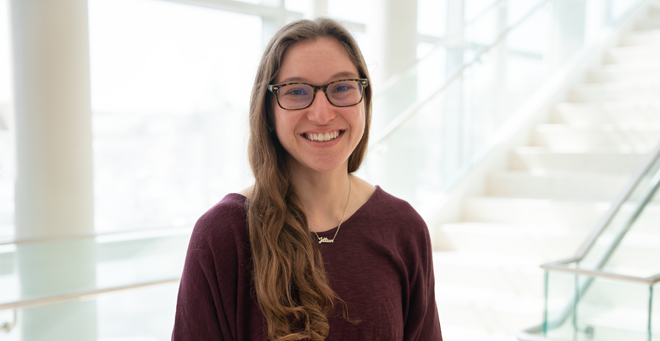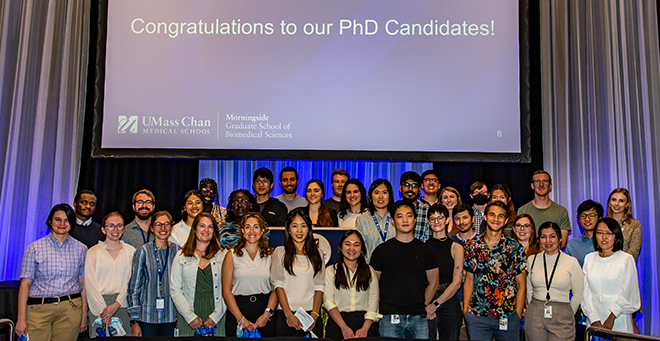
Jillian Belgrad, an MD/PhD student at UMass Chan Medical School, has received a Ruth L. Kirschstein National Research Service Award Individual Predoctoral Fellowship from the National Institute of Neurological Disorders and Stroke to study the pathology that drives the development of Huntington’s disease symptoms.
Huntington’s disease is a rare genetic condition that damages nerve cells in the brain and causes uncontrolled movements and a decline in cognitive ability. Symptoms can appear at any age and the disease is fatal. Working in the lab of Anastasia Khvorova, PhD, the Remondi Family Chair in Biomedical Research and professor of RNA therapeutics, Belgrad is studying a phenomenon that occurs in Huntington’s disease called somatic repeat expansion.
“Through patient data, we know that the more repeat expansion, the earlier disease onset occurs,” Belgrad said. “Hopefully, through understanding how to control somatic repeat expansion and the genes that facilitate it, we can use the tools available to us throughout the RNA Therapeutics Institute to silence these genes and create a therapeutic approach that can block repeat expansion, and delay or prevent onset of Huntington’s disease for patients.”
Belgrad is controlling gene expression using small interfering RNA—a class of short, noncoding RNA molecules that can be produced synthetically—and antisense oligonucleotides—short, synthetic, single-stranded oligonucleotides that can bind DNA; alter RNA; or reduce, restore or modify protein expression. Because the somatic repeat expansion phenomenon isn’t unique to Huntington’s disease, Belgrad said there are other potential applications for this work.
“Where a lot of the current clinical trials for Huntington’s disease have struggled or may not have had the success we hoped for, this may be a completely different approach that can be used either in isolation or in combination with the therapeutics that are currently being studied in order to hopefully target the key pathway that’s driving Huntington’s disease, and in turn, other diseases as well,” Belgrad said.
Belgrad has been fascinated with the brain since she was an undergraduate at Colgate University studying neuroscience and her interest grew during work in the NIH postbaccalaureate program. At UMass Chan, she has flourished under the mentorship of Dr. Khvorova and Neil Aronin, MD, the Higgins Family Professor in Neuroscience and professor of medicine. Belgrad hopes to run a lab that supports adult and pediatric populations, likely within the neurosciences, that also addresses genetic and rare disorders.
“Jillian is a rising star in the program who does not see barriers in pursuing the development of novel therapeutics for Huntington’s disease and other repeat expansion disorders,” Khvorova said. “Her project has a promise of reversing the disease progression with short-term treatment. I am delighted to be able to work with her and advise her on this path.”



